BANK OF ALBANIA
PRESS RELEASE
Bank of Albania organises the Virtual Conference: “Covid-19: The Impact on the Economy and Central Bank Policies
Publication date: 29.10.2020
The Bank of Albania co-organised with the London School of Economics and Political Science (LSE) the Virtual Conference: COVID-19: The Impact on the Economy and Central Bank Policies”, on 29 October 2020.
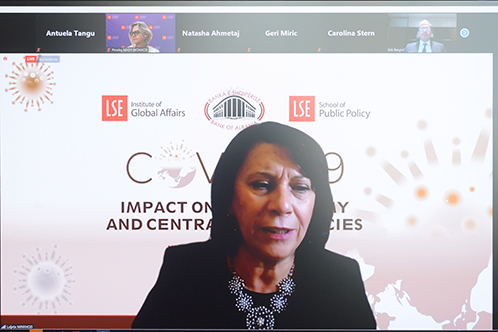
The conference brought together senior central bankers from the region, policy makers in the fields of economy and finances, representatives from international financial institutions, market participants and leading academics.
This conference is organised under the auspices of the Governor of the Bank of Albania, Mr Gent Sejko, who was unable to join the conference proceedings, as he is tested positive for COVID-19. Fortunately, Governor Sejko is in good health conditions and has started the mandatory quarantine.
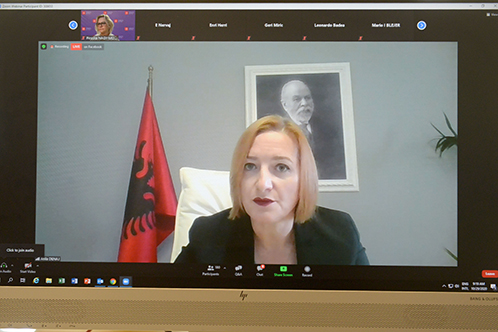
This is the third year that the Bank of Albania co-organises its Annual Conference with the London School of Economics and Political Science (LSE), among the top 10 universities in the world in the field of social, economic, political and international studies.
The purpose of this regular conference was to provide a discussing platform of COVID-19 impact on the real economy both in advanced economies and in Europe’s emerging markets; how central banks have adapted their policy toolkits to respond to the challenges arisen in the situation created by pandemic, with special focus in South -Eastern European countries, and in Albania.
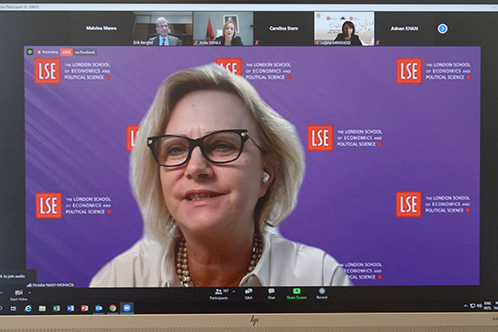
In addition, the Conference addressed the way the emerging countries implemented expansionary policies like the advanced economies; the enlargement of economic policies packages as well as the maintaining of economic and financial stability of the country; the role of main central banks, the European Central Bank and Federal Reserve; and the implications on long term period in inflation, financial stability, non-performing loans, etc.
Organised in two sessions, conference proceedings were opened by the welcome address by Ms Luljeta Minxozi, First Deputy Governor of the Bank of Albania; Ms Piroska Nagy-Mohacsi, Interim Director, Institute of Global Affairs, LSE School of Public Policy; Mr Erik Berglof, LSE & Chief Economist, Asia Infrastructure Investment Bank (AIIB); and Ms Anila Denaj, Minister of Finance and Economy.
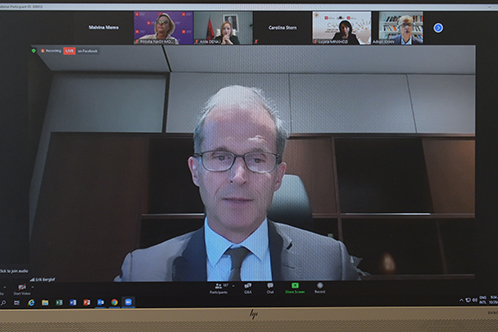
In her address, Deputy Governor Minxhozi stated that Covid-19 pandemic has the undoubted potential to re-shape our way of life. As the health emergency is still unfolding, for policy-making institutions, particularly in emerging economies, the challenge to fulfil key objectives like price stability, sustainable growth and financial stability, is driving them into uncharted operational territory.
Ms Minxhozi emphasised that the indispensable implementation of containment restrictions paved the way towards a synchronized global recession; however, the easing of lockdown measures and the deployment of both fiscal and monetary policies at national level, have started to pull up the global economy from the brink of collapse. In Albania, the scale of the two key support measures at national level, fiscal and monetary policy, reached unprecedented levels in many economies, not seen even during the recent global crisis of 2008.
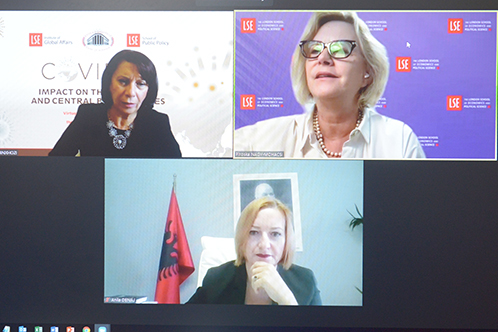
The First Deputy Governor pointed out that the pandemic has tested the resilience of the Albanian economy and of our banking system. The Bank of Albania has used a wide range of policies to support financial activity and aggregate demand. In addition, the Albanian Government delivered fiscal accommodation. These timely, coordinated and comprehensive set of measures, were ultimately aimed both at containing the adverse economic impact and at preserving monetary and financial stability, as a precondition for the future recovery of the economy.
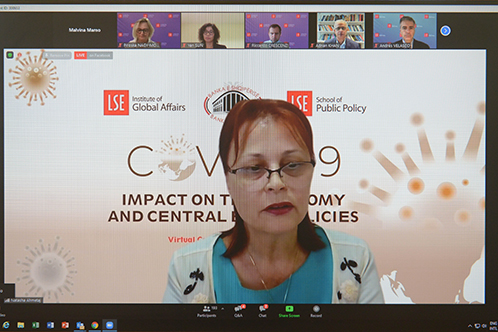
“I believe the Albanian economy enjoys sufficient preconditions for a gradual recovery”, the First Deputy Governor said. Focusing on the Bank of Albania's forecast, Ms Minxhozi stated that the overall policy stance should remain accommodative over the foreseeable future. However, policy makers should be careful in getting the policy mix right so that potential long-term costs do not outweigh short term benefits.
At the end of her address, First Deputy Governor Minxhozi thanked the participants and underscored her confidence that a frank exchange of ideas will enrich our joint understanding on the nature of challenges we are facing as well as on the best policies and instruments we should deploy to tackle them.
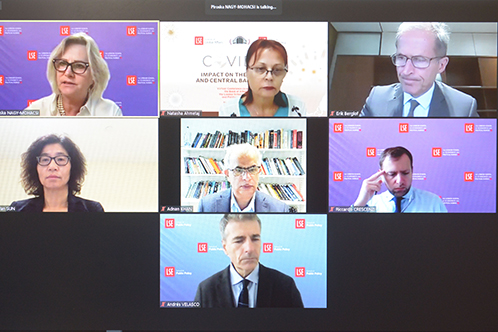
The first session of the conference addressed: “Managing the Risks of COVID-19: Impact on the Real Economy main elements”. The panel of this session brought together: Chair: Ms Piroska Nagy-Mohacsi, Interim Director, Institute of Global Affairs, LSE School of Public Policy; and the experts: Mr Erik Berglof, LSE & Chief Economist, Asia Infrastructure Investment Bank (AIIB); Ms Natasha Ahmetaj, Second Deputy Governor of the Bank of Albania; Mr Andrés Velasco, Dean, LSE School of Public Policy; Ms Yan Sun, Mission Chief for Albania, International Monetary Fund; Mr Adnan Khan, Professor, LSE School of Public Policy; Mr Riccardo Crescenzi, Professor, LSE Department of Geography and Environment.
The panel focused on the health crisis caused by Covid-19, the response of countries to protect the health of people, and to mitigate the shocks arisen from pandemic in the main macroeconomic indicators. The panellists assessed the swift and unprecedented reactions undertaken by authorities in both emerging and advanced countries, by considering the space and possibilities available to them. On the other hand, the health crisis, highlighted to the importance of coordinated policies at both national and global levels, as indispensable to mitigate the effects caused by the health crisis. In addition to macroeconomic impact arisen from the health crisis, discussions focused also on the challenges that countries will face in the future, by taking into account the heightened level of uncertainty. Particular attention should be paid for building up the policies that ensure and increase the countries'’ resilience, always in the view of the characteristics and problems of each country, in particular small ad open emerging countries.
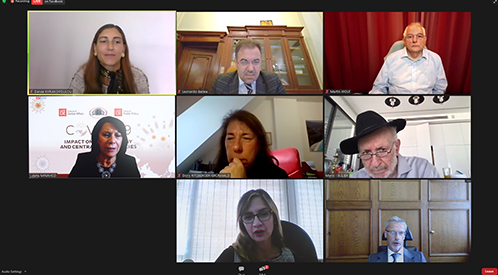
The Governor’s panel, chaired by Ms Danae Kyriakopoulou, Chief Economist, OMFIF, brought together central bankers and international experts, namely: First Deputy Governor of the Bank of Albania, Ms Luljeta Minxhozi; Governor of the National Bank of the Republic of North Macedonia, Ms Anita Angelovska Bezhoska; Governor of the National Bank of Croatia, Mr Boris Vujčić; Deputy Governor, National Bank of Romania; Mr Leonardo Badea; Chief Economics Commentator, Financial Times, Mr Martin Wolf; Director, Economic Analysis and Research Department, Oesterreichische Nationalbank, Ms Doris Ritzberger-Grünwald; and LSE, former Governor, Central Bank of Argentina and former Executive Director, Bank of England, Mr Mario Blejer.
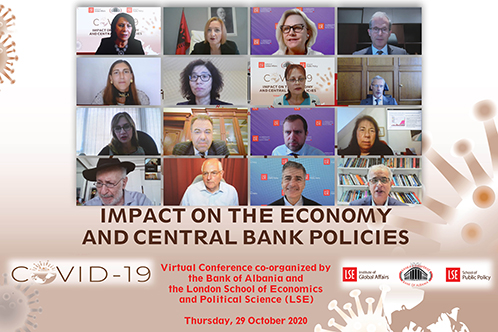
The panellists provided a summary of the monetary, macro and micro policies implemented by certain CESEE central banks to thoroughly support consumers, private sector and financial sector, and to mitigate the swift and strong negative effects of the crisis arisen from COVID-19, in coordination with fiscal authorities of respective countries. The main conclusions in this panel concurred that in addition to the rapid reaction against short-term recession, policy makers should show forward-looking and build policies to encounter the future health and financial crises, to ensure a long-term and stable economic growth, without jeopardising the macroeconomic and financial stability of the country. Also, structural and institutional reforms, at national level, are crucial to adopt the economy, labour market and the financial system to the technological developments and the changes imposed by pandemic. The inter-institutional, international and national coordination has a vital role to encounter the most complex challenges in the future, against the backdrop of a new normal.
- Frist Deputy Minxhozi Welcome Address to the Virtual Conference of the Bank of Albania
- Greeting speech by Anila DENAJ, Minister of Finance and Economy

 Linkedin
Linkedin
 Twitter
Twitter
 Youtube
Youtube
 Facebook
Facebook
 Flickr
Flickr
 RSS
RSS
 Subscribe
Subscribe
 Feedback
Feedback